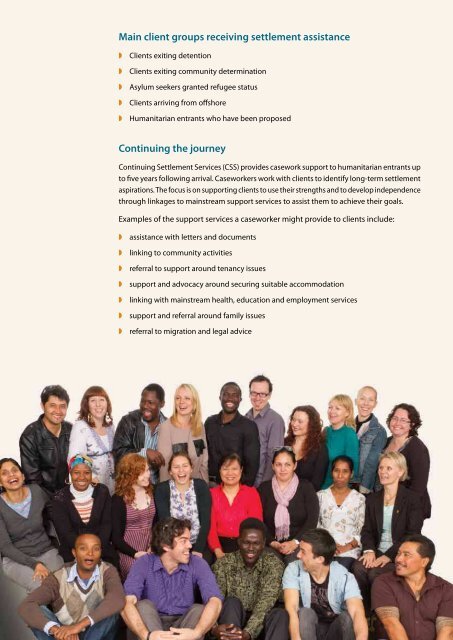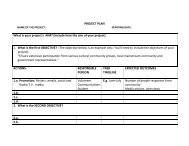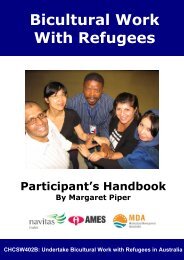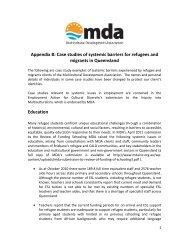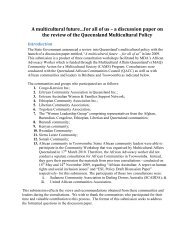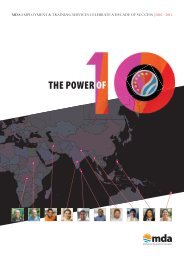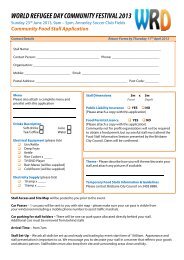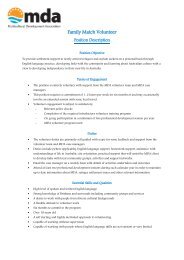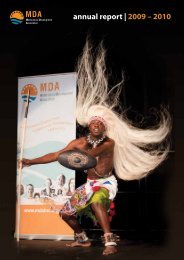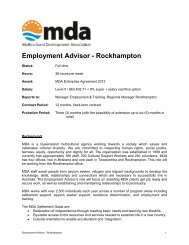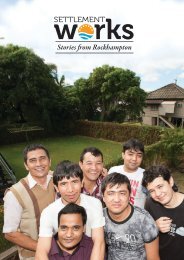annual report 2010 â2011 - Multicultural Development Association
annual report 2010 â2011 - Multicultural Development Association
annual report 2010 â2011 - Multicultural Development Association
Create successful ePaper yourself
Turn your PDF publications into a flip-book with our unique Google optimized e-Paper software.
Main client groups receiving settlement assistance<br />
◗ ◗ Clients exiting detention<br />
Intensive Support Services<br />
◗ ◗ Clients exiting community determination<br />
◗ ◗ Asylum seekers granted refugee status<br />
◗ ◗ Clients arriving from offshore<br />
◗ ◗ Humanitarian entrants who have been proposed<br />
Continuing the journey<br />
Continuing Settlement Services (CSS) provides casework support to humanitarian entrants up<br />
to five years following arrival. Caseworkers work with clients to identify long-term settlement<br />
aspirations. The focus is on supporting clients to use their strengths and to develop independence<br />
through linkages to mainstream support services to assist them to achieve their goals.<br />
Examples of the support services a caseworker might provide to clients include:<br />
◗◗<br />
◗◗<br />
◗◗<br />
◗◗<br />
◗◗<br />
◗◗<br />
◗◗<br />
assistance with letters and documents<br />
linking to community activities<br />
referral to support around tenancy issues<br />
support and advocacy around securing suitable accommodation<br />
linking with mainstream health, education and employment services<br />
support and referral around family issues<br />
referral to migration and legal advice<br />
MDA’s Intensive Support Services (ISS) team offers support to a small number of clients with<br />
exceptional needs which exceed the capacity of most services.<br />
Our highly skilled ISS team provides critical support for complex casework, crisis intervention<br />
and intensive intervention and prevention for clients from a refugee background with needs<br />
around mental health, child safety, family breakdown, complex health, disability or difficulties<br />
with settlement life skills. Support may be provided to clients for up to six months, with the<br />
possibility of extension.<br />
The ISS team addresses barriers—both personal and systemic—which prevent their clients’<br />
successful settlement and focus on restoring a sense of hope and dignity.<br />
The foremost strengths of complex case intervention are that it includes:<br />
◗◗<br />
◗◗<br />
◗◗<br />
◗◗<br />
crisis intervention<br />
intensive support to address chronic and causal issues<br />
capacity building to develop client skills and knowledge to enable greater self-determination<br />
case coordination of multiple agency involvement<br />
A recent increase in these complex cases is attributable to people exiting from long periods<br />
of detention. At the start of the financial year there were 27 active cases with 52 referrals over<br />
the year to June 2011. At the close of the year, 25 cases were ongoing.<br />
Although this intensive, specially tailored work is resource intensive, it enables<br />
many clients to eventually access mainstream services to continue their<br />
settlement journey.<br />
A handful of cases in regional areas have been managed through partnerships with local<br />
services and the use of Cultural Support Workers.<br />
In 2011 MDA and Queensland Program of Assistance to the Survivors of Torture and Trauma<br />
(QPASTT) again partnered to develop and implement the ‘Building Stronger Families’ program<br />
for MDA’s clients with complex needs. The group targeted parenting practices, including<br />
alternative discipline strategies, child development, family fun and communication.<br />
10 MULTICULTURAL DEVELOPMENT ASSOCIATION | ANNUAL REPORT | <strong>2010</strong> – 2011 MULTICULTURAL DEVELOPMENT ASSOCIATION | ANNUAL REPORT | <strong>2010</strong> – 2011<br />
11


